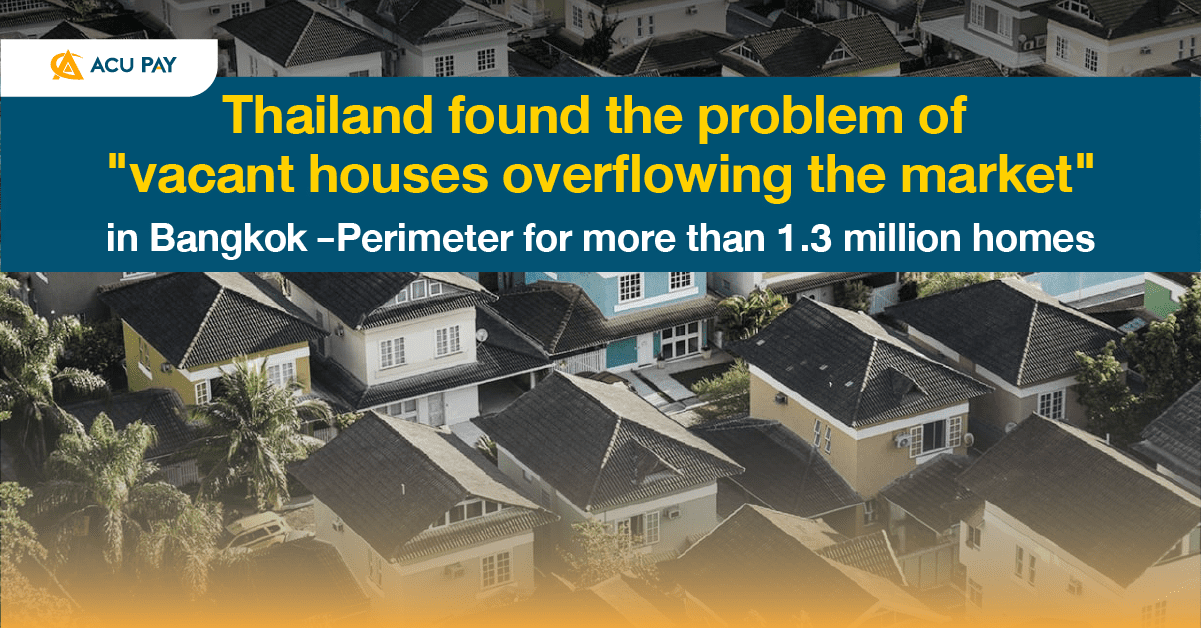

The increasing construction of houses is in contrast to the decreasing population due to Thailand’s entry into the elderly society. The real estate market has a problem of ‘vacant houses’ with more than 1.3 million houses, worth over 2.6 trillion baht. ACU PAY will talk about how to solve this problem.
Dr.Sopon Pornchokchai, President of Thailand Real Estate Research and Evaluation Center, Agency for Real Estate Affairs (AREA.co.th), used the data from the Metropolitan Electricity Authority (MEA) to analyze the problem of vacant houses in Thailand, which means houses are built completely but have no residents or once have residents but have moved out of the houses, causing the abandoned houses, including single houses, twin houses, townhouses, commercial buildings, and apartments.
According to the Metropolitan Electricity Authority (MEA), there are approximately 500,000 vacant house units but if vacant houses in Bangkok- Perimeter, including some parts of regional electricity, are combined, there will be 617,923 vacant houses which is considered a huge number. In this regard, there are 4,654,370 housing units of all types of houses in the Bangkok and Perimeter Area. Therefore, vacant houses account for 13.3% of all dwellings, or one unit per 8 houses has a vacant house.
According to the Thai Real Estate Research and Evaluation Center, it is estimated that there will be vacant housing units of 1,309,551 housing units out of 27,708,635 housing units nationwide, or 4.7%, which means that there is about one vacant house in every 21 houses.
The problem of vacant houses in Thailand has caused many to worry about whether the situation will be repeated as in Japan. The number of vacant houses in Thailand is still small compared to 8 million housing units or six times higher than that of Thailand.
In addition, access to home loans is still low, with only 35% of the total debt. Causing the slowdown in the real estate sector. Housing prices will have an impact on limited income and the overall economy as other industries continue to support property growth. Meanwhile, Japanese property during the crisis had reached 30-40 % per GDP.
Although the Thai real estate sector in the future may not be as critical as Japan’s, a slowdown in the real estate sector may affect other sectors of the economy, including the economic and financial sectors. Dr. Sophon said that the solution would be to assess these properties based on market prices. For example, if the average unit price is 2 million baht per unit, tax is 2% or 40,000 baht per year to encourage owners to use or sell them to increase the supply in the market for people. As more supply enters the market, housing prices will not be too high and people’s ability to buy houses will not be affected.
If there is any house without any movement or be taxed for three consecutive years, the government should put it up for auction to pay back any remaining taxes. If the owner cannot be found at that time, then deposit it to a financial institution so that the owner (if any) can receive it later.
Moreover, buying new homes will also have a positive impact on related industries, such as buying construction materials for renovation, repairing, addition, buying new furniture, or applying for insurance loans. In addition, buying these vacant homes is relatively cheap compared to first-hand houses, making it easier for people to have a house without having to build Pracharat or Auarathorn houses.